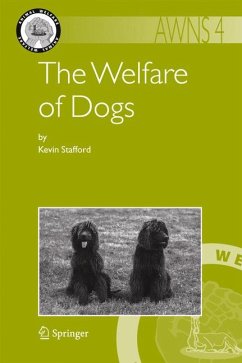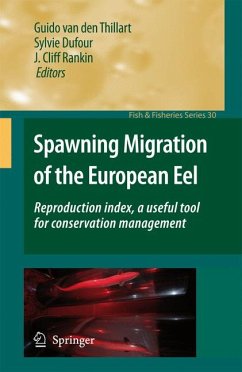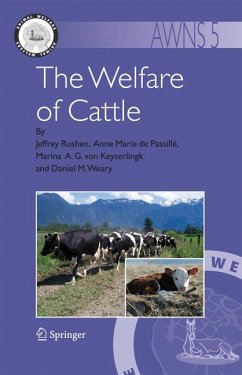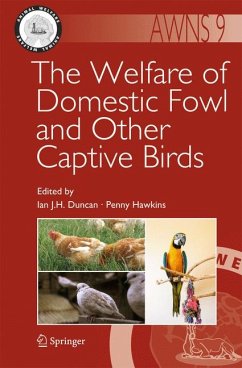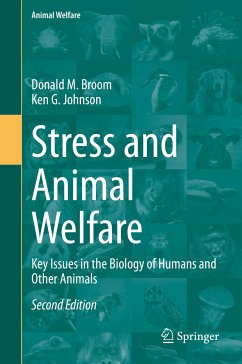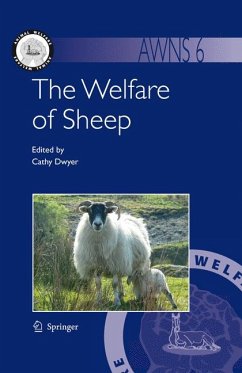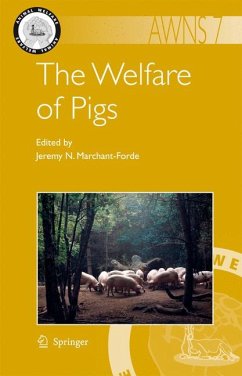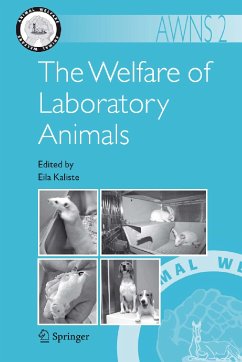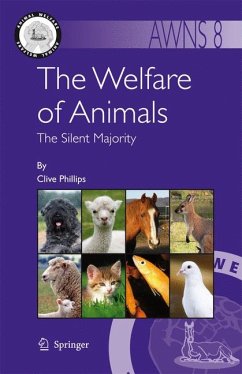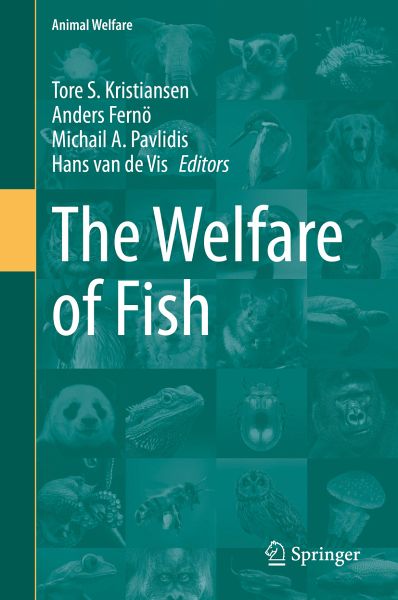
eBook, PDF
The Welfare of Fish (eBook, PDF)

PAYBACK Punkte
52 °P sammeln!






Offers vital insights into the life of fishes and their amazing abilities
Introduces readers to the knowledge base for including fish within the moral circle
The first book to address the welfare of wild, farmed and ornamental fishes
Dieser Download kann aus rechtlichen Gründen nur mit Rechnungsadresse in A, B, BG, CY, CZ, D, DK, EW, E, FIN, F, GR, HR, H, IRL, I, LT, L, LR, M, NL, PL, P, R, S, SLO, SK ausgeliefert werden.
Tore S. Kristiansen is an experienced leader at the Animal Welfare research group, Institute of Marine Research (IMR) in Bergen, Norway, and also heads the Norwegian National Committee for the Protection of Animals Used for Scientific Purposes. He completed his Master's and PhD in Fisheries Biology at the University of Bergen, Norway and subsequently became a researcher at the IMR, where he has focused on fish welfare research ever since. Having served as a project leader and coordinator of several national and European research projects concerning fish welfare, his expertise covers a broad range of areas, including population dynamics, stock enhancement, and juvenile production of Atlantic cod and lobster; behavior, cognition and learning ability of cod, halibut, and salmon; stress- and neurobiology, and the welfare of farmed fish. Anders Fernö is a Professor Emeritus at the Department of Biological Sciences at the University of Bergen, Norway. He started his academic studies at the University of Lund, Sweden and completed his PhD at the University of Stockholm, Sweden. He became an Assistant Professor and later Professor at the University of Bergen and was also Adjunct Chief Scientist at the Institute of Marine Research in Bergen. His research focuses on the behavior of marine and freshwater fish. His expertise covers a broad field including ontogeny and learning, spatio-temporal dynamics and schooling dynamics, with applications in the distribution of commercial fish species, fish capture, aquaculture, sea ranching, and welfare. Fernö has been member of the editorial board of Applied Animal Behaviour Science. Michalis A. Pavlidis is a Professor at the Department of Biology, University of Crete, Greece. He received his M.Sc in Public Health from the School of Public Health and Hygiene, Athens and his PhD in Biology from the University of Athens, Greece. His fields of specialization include reproductive biology, pigmentation physiology, stress and welfare of cultured fish species and zebrafish. Dr. Pavlidis has participated in several R&D projects and networks and he has published numerous scientific papers on fish physiology and aquaculture. He was a member of the EFSA working group for the assessment of welfare of European sea bass and gilthead sea bream. He is a member of the Standing Committee on Agricultural Research (SCAR) - Fish Strategic Working Group. He coordinates the Erasmus Plus Joint Master's Degree in "Aquaculture, Environment and Society" and the summer course "Care and Use of Laboratory Animals: Mice, Rats and Zebrafish". Hans van de Vis is a senior researcher at the Department of Animal Health and Welfare, Wageningen Livestock Research, the Netherlands. He received his M.Sc in Biochemistry from Utrecht University, the Netherlands and his PhD in Agricultural Sciences at Wageningen University, the Netherlands. His fields of specialization include stress and welfare of cultured and captured fish species. Dr. Van de Vis has participated in several R&D projects and networks and he has published numerous scientific papers on fish welfare. He was a member of the EFSA working group for the assessment of welfare during farming of European eel and welfare at slaughter of European eel, sea bass and gilthead sea bream. He is a member of Wageningen Institute of Animal Sciences, Wageningen, the Netherlands.
Produktdetails
- Verlag: Springer Nature Switzerland
- Seitenzahl: 515
- Erscheinungstermin: 1. Juli 2020
- Englisch
- ISBN-13: 9783030416751
- Artikelnr.: 61153953
"There is valuable depth and novelty here ... . Anyone working or interested in the area of fish welfare would find new and useful information in this book. ... I would certainly advise all students or early career scientist working in the field of fish welfare to read The Welfare of Fish. For those longer in the tooth (or the field), you will also find value, novelty and some beautifully written text." (James Turnbull, Animal Welfare, Vol. 30 (2), May, 2021)
Für dieses Produkt wurde noch keine Bewertung abgegeben. Wir würden uns sehr freuen, wenn du die erste Bewertung schreibst!
Eine Bewertung schreiben
Eine Bewertung schreiben
Andere Kunden interessierten sich für
1) Gebundener Aktionspreis des Verlages. Die Ersparnis bezieht sich auf den gebundenen Preis, der außerhalb des Aktionszeitraums gilt.
| 2) Gebundener Einführungspreis des Verlages. Die Ersparnis bezieht sich auf den gebundenen Preis, der nach der Einführung gilt.
| 3) Gebundener Einführungspreis. Die Ersparnis bezieht sich auf den gebundenen Preis, der nach der Einführung gilt.
| 4) Die Ersparnis bezieht sich auf den gebundenen Preis, der außerhalb des Aktionszeitraums gilt.
| 5) Ersparnis im Vergleich zum gebundenen Preis für die Originalausgabe mit höherwertiger Ausstattung.
| 6) Ersparnis im Vergleich zum niedrigsten Preis der vergangenen 30 Tage.
| 7) Ersparnis im Vergleich zum Preis der gedruckten Ausgabe (broschiertes Buch).
| 8) Ersparnis im Vergleich zum Preis der gedruckten Ausgabe (broschiertes Schulbuch)
| 9) Ersparnis im Vergleich zum Preis der gedruckten Ausgabe (Buch mit Leinen-Einband)
| 10) Ersparnis im Vergleich zum Preis der gedruckten Ausgabe (gebundenes Buch)
| 11) Ersparnis im Vergleich zum Preis der gedruckten Ausgabe
| 12) Ersparnis im Vergleich zum vorherigen gebundenen Ladenpreis
| 13) Ersparnis im Vergleich zur Audio-CD-Ausgabe
| 14) Ersparnis im Vergleich zur CD-Ausgabe
| 15) Ersparnis im Vergleich zur deutschen Hardcover-Ausgabe
| 16) Ersparnis im Vergleich zur deutschen Taschenbuch-Ausgabe
| 17) Ersparnis im Vergleich zur früheren unverbindlichen Preisempfehlung (UVP) des Herstellers
| 18) Ersparnis im Vergleich zur Summe der vorherigen gebundenen Einzelpreise der im Sammelband/Schuber enthaltenen Bücher.
| 19) Ersparnis im Vergleich zur unverbindlichen Preisempfehlung (UVP) des Verlags der Originalausgabe
| 20) Ersparnis im Vergleich zur unverbindlichen Preisempfehlung (UVP) des Herstellers
| 21) Sonderausgabe. Ersparnis im Vergleich zum gebundenen Preis für die Originalausgabe mit zum Teil höherwertiger Ausstattung
| 22) Ersparnis im Vergleich zum früheren gebundenen Preis
| 23) Ersparnis im Vergleich zum niedrigsten Preis der vergangenen 30 Tage
| 24) Ersparnis im Vergleich zum niedrigsten Preis der vergangenen 30 Tage
| 25) Frühere unverbindliche Preisempfehlung des Herstellers
Alle Preise in Euro und inkl. der gesetzl. MwSt. | Innerhalb Deutschlands liefern wir preisgebundene Bücher versandkostenfrei. Weitere Informationen: bitte hier klicken
Bewertung schreiben
BEWERTUNGSFORMULAR
Schließen
Support
Bitte wähle dein Anliegen aus:
Rechnungen
Bestellstatus
Retourenschein
Storno
Sollte dein Anliegen nicht dabei sein, findest du weitere Auskünfte zu deinen Fragen auf unseren Serviceseiten.
Schließen


